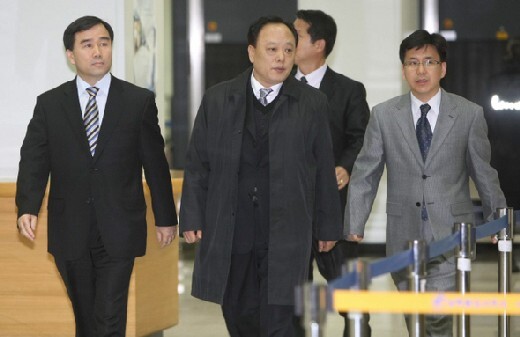hankyoreh
Links to other country sites 다른 나라 사이트 링크
N. Korea to stop Gaeseong tours, rail service

Inter-Korean relations are racing toward a worst-case scenario. Pyongyang is effectively barring all overland North-South exchanges such as tourism at Gaeseong (Kaesong), with the exception of private business activities in the Gaeseong Industrial Complex.
In a message November 24, Kim Yong-chol, Korean People’s Army lieutenant general (equivalent to major general in the South Korean army) and leader of the North Korean delegation at the general-level inter-Korean military talks, announced, “Overland passage of all South Korean private groups and businesspeople traveling to North Korea over land for purposes such as cooperation, exchange and economic transactions is to be barred beginning December 1, and passage across the Military Demarcation Line by those involved in economic cooperation and exchange cooperation projects will be strictly limited and blocked.” As a result, nine months after the launch of the Lee Myung-bak administration, inter-Korean relations have been set back 10 years, which have now literally become a “lost decade.”
North Korea sent a total of four messages November 24, one each to Moon Moo-hong, South Korean chairman of the management committee for the Gaeseong Industrial Complex; resident businesses; KOTRA Chief Director Kim Ju-cheol and Hyundai Asan Executive Vice President Kim Chul-soon. It also separately called over 80 corporation heads from tenant businesses of the Gaeseong Industrial Complex and committee chair Moon Moo-hong to the industrial complex site and requested that they provide information about permanent personnel and the number of vehicles for each business.
However, in a message sent to Gaeseong Industrial Complex tenant businesses, North Korea stated, “In consideration of the difficult position of smaller businesses, we have decided to make a special exception and guarantee that business activity will be allowed in the Gaeseong Industrial Complex.” It also wrote, “We have decided to leave those of the permanent personnel for the South’s manufacturers who are exceedingly necessary for operation and exclude them from the measure of closing the Military Demarcation Line and overland passage.”
North Korea’s government-operated Central News Agency promptly communicated the contents of the November 24 message in delegation head Kim Yong-chol’s name, warning, “They should not take lightly the warning of our military, which does not know of empty words.” Referring in particular to a statement by President Lee Myung-bak at a talk with journalists in Washington, in which he said, “The ultimate goal is unification under a liberal democratic system,” the KCNA claimed, “He is providing conclusive proof that the respect for the two statements (the June 15 Joint Declaration and the October 4 inter-Korean Summit Declaration) and the resumption of dialogue for their implementation are nothing more than hypocrisy.” By saying that the measures announced November 24 were “primary,” Kim Yong-chol indicated that an additional interruption of all projects in the Gaeseong Industrial Complex could occur.
With this measure, operation of the Gyeongui Line train, which ran to Gaeseong’s tourism zone and between Munsan in South Korea and Bongdong in North Korea, was discontinued completely, and the management committee for the Gaeseong Industrial Complex must order half of its employees, including the committee’s chair or vice-chair, to withdraw by the end of November. Also, all businesses in the complex, including construction businesses, are to reduce their permanent staff by half, and Gaeseong’s office for inter-Korean economic cooperation and discussion has been closed. Besides this, only 30 percent of permanent personnel and vehicles for Hyundai Asan partner firms within Gaeseong are to remain.
The government discussed countermeasures on the afternoon of November 24 as presidential Chief of Staff Chung Jung-gil held a meeting of security-related ministers that included Unification Minister Kim Ha-joong, Defense Minister Lee Sang-hee and National Intelligence Service director Kim Sung-ho. Following the meeting, Unification Ministry spokesman Kim Ho-nyeon issued a statement expressing “profound regret” and saying, “If these measures are carried out unilaterally, they will be in violation of the agreement between North and South Korea, and we will strongly urge their rescindment.”
Please direct questions or comments to [englishhani@hani.co.kr]
Editorial・opinion
![[Column] Park Geun-hye déjà vu in Yoon Suk-yeol [Column] Park Geun-hye déjà vu in Yoon Suk-yeol](https://flexible.img.hani.co.kr/flexible/normal/500/300/imgdb/original/2024/0424/651713945113788.jpg) [Column] Park Geun-hye déjà vu in Yoon Suk-yeol
[Column] Park Geun-hye déjà vu in Yoon Suk-yeol![[Editorial] New weight of N. Korea’s nuclear threats makes dialogue all the more urgent [Editorial] New weight of N. Korea’s nuclear threats makes dialogue all the more urgent](https://flexible.img.hani.co.kr/flexible/normal/500/300/imgdb/original/2024/0424/7317139454662664.jpg) [Editorial] New weight of N. Korea’s nuclear threats makes dialogue all the more urgent
[Editorial] New weight of N. Korea’s nuclear threats makes dialogue all the more urgent- [Guest essay] The real reason Korea’s new right wants to dub Rhee a founding father
- [Column] ‘Choson’: Is it time we start referring to N. Korea in its own terms?
- [Editorial] Japan’s rewriting of history with Korea has gone too far
- [Column] The president’s questionable capacity for dialogue
- [Column] Are chaebol firms just pizza pies for families to divvy up as they please?
- [Column] Has Korea, too, crossed the Rubicon on China?
- [Correspondent’s column] In Japan’s alliance with US, echoes of its past alliances with UK
- [Editorial] Does Yoon think the Korean public is wrong?
Most viewed articles
- 1‘We must say no’: Seoul defense chief on Korean, USFK involvement in hypothetical Taiwan crisis
- 2N. Korean delegation’s trip to Iran shows how Pyongyang is leveraging ties with Moscow
- 3Amnesty notes ‘erosion’ of freedom of expression in Korea in annual human rights report
- 4‘Weddingflation’ breaks the bank for Korean couples-to-be
- 5[Reportage] On US campuses, student risk arrest as they call for divestment from Israel
- 6[Column] Park Geun-hye déjà vu in Yoon Suk-yeol
- 7Korea sees more deaths than births for 52nd consecutive month in February
- 8Will NewJeans end up collateral damage in internal feud at K-pop juggernaut Hybe?
- 9[Guest essay] The real reason Korea’s new right wants to dub Rhee a founding father
- 10[Editorial] New weight of N. Korea’s nuclear threats makes dialogue all the more urgent